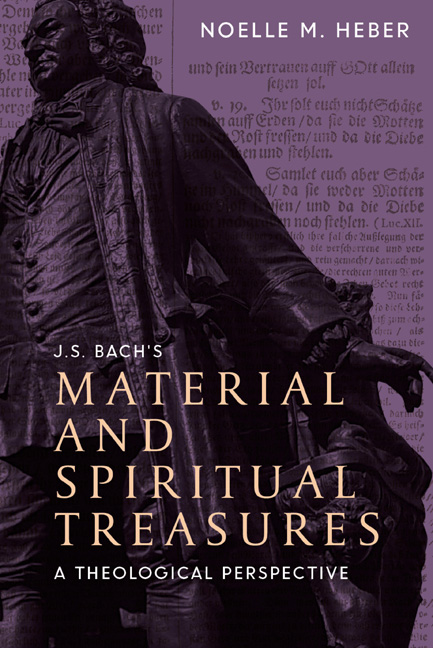Book contents
- Frontmatter
- Dedication
- Contents
- List of Illustrations
- List of Music Examples
- Foreword
- Preface
- List of Abbreviations
- Introduction
- 1 Bach’s Material Treasures: Career, Salary, and Freelancing
- 2 The Servant Prince: Poverty of Christ: Three Days of Christmas (BWV 91, 197a, 248/I, 121, 151)
- 3 Mammon’s Chain: The Destructive and Redemptive Potentials of Material Wealth: Ninth Sunday after Trinity (BWV 105, 94, 168)
- 4 The Afflicted Shall Eat: Tables Are Turned in Eternity: First Sunday after Trinity (BWV 75, 20, 39)
- 5 Spiritual Manna: The Lord Embraces the Poor: Seventh Sunday after Trinity (BWV 186, 187)
- 6 ‘Blood Money’: The Coins that Bought Jesus’ Death: Good Friday (St Matthew Passion)
- 7 Bach’s Spiritual Treasures: Values and Priorities
- Bibliography
- Index of Biblical References
- General Index
2 - The Servant Prince: Poverty of Christ: Three Days of Christmas (BWV 91, 197a, 248/I, 121, 151)
Published online by Cambridge University Press: 27 March 2021
- Frontmatter
- Dedication
- Contents
- List of Illustrations
- List of Music Examples
- Foreword
- Preface
- List of Abbreviations
- Introduction
- 1 Bach’s Material Treasures: Career, Salary, and Freelancing
- 2 The Servant Prince: Poverty of Christ: Three Days of Christmas (BWV 91, 197a, 248/I, 121, 151)
- 3 Mammon’s Chain: The Destructive and Redemptive Potentials of Material Wealth: Ninth Sunday after Trinity (BWV 105, 94, 168)
- 4 The Afflicted Shall Eat: Tables Are Turned in Eternity: First Sunday after Trinity (BWV 75, 20, 39)
- 5 Spiritual Manna: The Lord Embraces the Poor: Seventh Sunday after Trinity (BWV 186, 187)
- 6 ‘Blood Money’: The Coins that Bought Jesus’ Death: Good Friday (St Matthew Passion)
- 7 Bach’s Spiritual Treasures: Values and Priorities
- Bibliography
- Index of Biblical References
- General Index
Summary
Denn ihr wisset die Gnade unsers HErrn JEsu Christi, daß, ob er wohl reich ist, ward er doch arm umb euren willen, auff daß ihr durch seine Armuth reich würdet.
II Corinther 8.9ONE of the greatest paradoxes of all time is the idea that God, the Creator of heaven and earth and all that is in them, would enter into his creation in human form. The birth of Christ commences the story of the gospel and marks one of the two main yearly celebrations of the Christian church (the second being Christ's resurrection). A string of metaphors and images surrounding this divine birth can be found in the Bible, in Lutheran theology, and in Bach's church compositions. One of these is the consequential effect of Christ's birth and death for believers as expressed in II Corinthians 8.9:
For you know the grace of our Lord Jesus Christ, that, although he is rich, yet he became poor for your sake, that you through his poverty might become rich.
Closely related to this is the identification of Jesus as the ‘highest good’ or ‘most precious treasure’, a theme that often emerges in sermons about his birth. The texts of Bach's sacred music describe Jesus as a ‘treasure’ in the context of both his birth (Christmas cantatas/Oratorio) and death (St Matthew Passion), elsewhere contrasting that treasure with the fleeting nature of earthly wealth. Theologically, the descent of Christ from heavenly glory to earthly humiliation is often tied to Christ's suffering – ultimately in his death – for the salvation of those who believe in him.
The Advent of the coming of Jesus opens the church year and focuses simultaneously on Jesus’ past descent to earth as an infant and his future return in glory. Markus Rathey shows that Lutheran theology in the seventeenth and eighteenth centuries defined three levels of Christ's coming, adding to the past and future significance the ‘present’ coming of Christ in the spirit or, as worded by Johann Joachim Neudorf (169?–1752), ‘into our hearts’ [‘in unsere Hertzen’].2 After four Sundays of anticipation in the church year, three consecutive days are devoted to the celebration of Christmas. Bach composed his Christmas Oratorio and Christmas cantatas for this occasion.
- Type
- Chapter
- Information
- J. S. Bach's Material and Spiritual TreasuresA Theological Perspective, pp. 63 - 90Publisher: Boydell & BrewerPrint publication year: 2021

